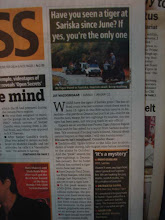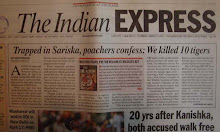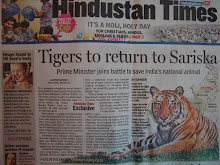8 March, 2005
If you thought poaching should top the agenda when Prime Minister Manmohan Singh convenes the National Board for Wildlife on March 17, ostensibly to discuss the ‘‘biggest tiger crisis ever’’, think again.
In the agenda paper prepared by the Ministry of Environment and Forest (MoEF), the word poaching doesn’t figure at all.
And this omission is deliberate.
Justifying the omission of the P-word, Dr Prodipto Ghosh, Secretary, MoEF, says: ‘‘Poaching has to be established first. Investigations are on.’’
But that opinion is not shared by wildlife experts, including current and former members of the wildlife board.
Says Dr Ullas Karanth, member, Project Tiger Steering Committee, and ex-member of the Board: ‘‘Come on, who they are trying to fool? Almost every tiger reserve is facing the problem of poaching. There are cases registered which suffer from bad prosecution. The Ministry has never been serious. I don’t expect any transparency from them any more.’’
A number of members of the Board—a statutory body under the chairmanship of the PM—are livid but hesitate to come on record before the meet, which is being convened after more than a year.
But not tiger expert Valmik Thapar: ‘‘In the agenda notes, there is a 3-page description on the state of the tiger and specially the problems of Sariska. It is shocking that there is not a mention of the word poaching. The PM has asked the Rajasthan CM to fix responsibility for the disappearance of the tiger. What does it mean? Have tigers vanished taking some migratory route to Siberia? Or they have been poached?’’
On January 23, The Sunday Express had first reported on the missing tigers in Sariska, followed by reports in The Indian Express on a similar crisis in Ranthambhore. On March 6, The Sunday Express highlighted a brewing tiger crisis in Madhya Pradesh’s Panna reserve.
The Ministry’s attempt to sideline the poaching issues is surprising given the fact the PM, in his letter to the Rajasthan CM on March 1, clearly urged action against poaching and wanted the state to carry out ‘‘raids in the vicinity of townships near the parks to control sale and purchase of bush meet and identify the suppliers—on a campaign basis’’.
In 2000, the Supreme Court had asked the Ministry to prepare a report in consultation with the chief secretaries of all states on the problems facing wildlife management.
In his affidavit, then MoEF secretary Vishwanath Anand listed a range of issues. ‘‘Poaching’’ figured second on the list, next to ‘‘degradation of habitat’’. The problems of poaching also figure as a core concern in the National Wildlife Action Plan.
Says P V Jayakrishnan, former secretary, MoEF, and chairman, Central Empowered Committee constituted by the SC: ‘‘Poaching has always been the biggest problem for us. How can you discuss tiger crisis and be silent on poaching? In all previous meetings, poaching menace was a prominent point in the agenda.’’
Wary of controversy, the PM’s Media Advisor Dr Sanjay Baru prefers to leave the issue to the Forest Ministry, pointing out that any member of the Board is naturally free to raise any ‘‘unlisted issue’’ during the March 17 meet.
MoEF secretary Dr Ghosh also insists that the government is open to ‘‘free discussion’’.
Counters Thapar: ‘‘That’s understood and I will definitely take up the issue. But the omission shows how the officials are not willing to call a spade a spade.’’
Subscribe to:
Post Comments (Atom)




No comments:
Post a Comment